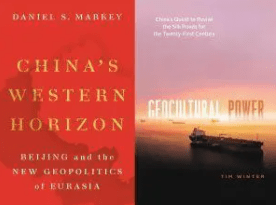President Xi Jinping has initiated major economic development programs within China and beyond its borders, including through the controversial Belt and Road Initiative which is forging worldwide connections in infrastructure, trade, energy, finance, culture and tourism. This places China at the center of a geography of overland and maritime connectivity stretching across more than sixty countries and incorporating almost two-thirds of the world’s population. However, despite China’s wide ambition, its engagement abroad and the Belt and Road Initiative will be shaped and redefined as they confront the ground realities of local and regional politics outside China. Essentially, what does it mean to revive the Silk Roads for the twenty-first century? What are the implications for U.S.-China competition and cooperation in the region? David Markey and Tim Winter will address these important questions based on two monographs they recently published.
About the Speakers:
Daniel Markey, Author, “China’s Western Horizon: Beijing and the New Geopolitics of Eurasia”
Daniel Markey, PhD, is a Senior Research Professor and Academic Director at Johns Hopkins University’s School of Advanced International Studies (SAIS) Global Policy Program and a Senior Fellow with the SAIS Foreign Policy Institute. His latest book, “China’s Western Horizon: Beijing and the New Geopolitics of Eurasia,” was published by Oxford University Press in March 2020. As a senior fellow at the Council on Foreign Relations from 2007 to 2015 he wrote “No Exit from Pakistan: America’s Tortured Relationship with Islamabad.” From 2003 to 2007, Dr. Markey served on the Policy Planning Staff at the US Department of State.
Tim Winter, Author, “Geocultural Power: China’s Quest to Revive the Silk Roads for the Twenty-First Century”
Tim Winter is an Australian Research Council Professorial Future Fellow at the University of Western Australia, and Fellow of the Australian Academy of the Humanities. He pursues an interdisciplinary approach to understand how the past and present are mutually constituted. Tim is author of “Geocultural Power: China’s Quest to Revive the Silk Roads for the Twenty First Century” (University of Chicago Press 2019) and “The Silk Road: geocultural pasts, geostrategic futures” (Oxford University Press, 2022). See silkroadfutures.net.
Rodger Baker, Discussant
Rodger Baker is Senior Vice President for Strategic Analysis for Stratfor. He has spent more than two decades with Stratfor focused on the Indo-Pacific region, with special attention to China and the Korean Peninsula. He addresses the strategic dynamics of an evolving world system, looking at great power competition, the role of middle powers, and the impacts of technological, environmental, and demographic changes on geopolitical relationships. His core emphasis is the multidisciplinary approach to geopolitics and the evolution of international relations to develop mid-and long-term forecasts to assist companies, governments, and other globally engaged organizations make informed decisions. Mr. Baker is a Senior Fellow at the George H. W. Bush Foundation for U.S.-China Relations, a Steering Fellow for the Mackinder Forum, and teaches a certificate program in Geopolitical Analysis at Florida Atlantic University.
Sebastien Peyrouse, Moderator
Sebastien Peyrouse, PhD, is a Research Professor at the Central Asia Program in the Institute for European, Russian and Eurasian Studies (George Washington University) and a Senior Fellow with the George H. W. Bush Foundation for U.S.-China relations. His main areas of expertise are political systems in Central Asia, economic and social issues, Islam and religious minorities, and Central Asia’s geopolitical positioning toward China, India and South Asia.
Marlene Laruelle, Chair
Marlene Laruelle, Ph.D., is Director, Institute for European, Russian, and Eurasian Studies; Director, Central Asia Program; Co-Director, PONARS-Eurasia; and Research Professor of International Affairs at George Washington University. She works on political, social and cultural changes in the post-Soviet space. Marlene’s research explores the transformations of nationalist and conservative ideologies in Russia, nationhood construction in Central Asia, as well as the development of Russia’s Arctic regions. She has been the Principal Investigator of several grants on Russian nationalism, on Russia’s strategies in the Arctic, and on Central Asia’s domestic and foreign policies from the US State Department, the Defense Department, the National Science Foundation, Open Society Foundations, Carnegie Corporation of New York, the Henry Luce Foundation, etc.

